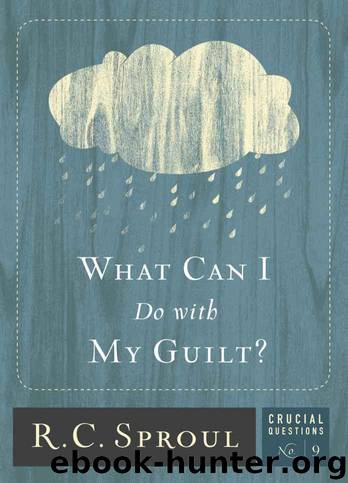What Can I Do With My Guilt? by R. C. Sproul

Author:R. C. Sproul
Language: eng
Format: azw3, epub
Publisher: Reformation Trust Publishing
Published: 2011-07-01T05:00:00+00:00
RATIONALIZING OUR BEHAVIOR
If denial of our guilt before God doesn’t work, the next step typically is to try to justify our behavior. We engage in rationalization, a spurious attempt to provide a sound, logical rationale for behavior that we know is wrong. Through rationalization, we seek to come up with an excuse for our immoral behavior.
Such excuses may be quite convincing, and they may be very effective in dealing with our friends or loved ones. They may even work to assuage the civil courts. However, God tells us that His law calls every human being to account, “that every mouth may be stopped” (Rom. 3:19). What does this mean? The Scriptures uniformly describe the situation of the final judgment, when God gathers every human being before His tribunal, as one of silence. In human courts of law, we often hear the injunction, “Silence in the court.” We observe a moment of silence when the judge comes in, but then the arguments begin as the lawyers start to set forth their cases. The Scriptures, however, say that the silence at the final judgment will be maintained. Every mouth will be stopped, because there will be no excuses, no denials, no protestations of innocence, no alibis. Paul tells us that we are without excuse when we violate the law of God (Rom. 1:20). In God’s court, we’re guilty, and nothing we can say can change it. It is absolutely futile for any human being to attempt to justify himself or herself before God.
Like denial, rationalization is designed to stifle or to quench the voice of the conscience. One of the reasons we do that is because guilt feelings are painful. There is an analogy, I think, between physical pain and psychological pain, the psychological pain that is associated with guilt feelings. Whenever a person experiences a stabbing pain, he is alarmed. He is uncomfortable because of it, so he seeks immediate relief. He might get painkillers to try to get rid of that uncomfortable feeling. Yet from a physical perspective, pain is an extremely important reality, because pain signals to us that there is something wrong, and if we cover up the pain, we could be covering up a life-threatening illness. Though we no longer suffer from the torment of the pain, we may be moving in a deadly direction.
By way of analogy, the pain that comes with guilt feelings is God’s way of sending an alarm to our souls that speaks to us and tells us there is something wrong that we need to deal with. But we try to get relief from the pain by denying it or excusing it rather than understanding that guilt feelings may, and often do, have a therapeutic and redemptive importance to our lives.
Download
This site does not store any files on its server. We only index and link to content provided by other sites. Please contact the content providers to delete copyright contents if any and email us, we'll remove relevant links or contents immediately.
The Secret Power of Speaking God's Word by Joyce Meyer(3169)
Signature in the Cell: DNA and the Evidence for Intelligent Design by Stephen C. Meyer(3125)
Real Sex by Lauren F. Winner(3012)
The Holy Spirit by Billy Graham(2942)
The Gnostic Gospels by Pagels Elaine(2527)
Jesus by Paul Johnson(2351)
Devil, The by Almond Philip C(2324)
23:27 by H. L. Roberts(2245)
The Nativity by Geza Vermes(2226)
Chosen by God by R. C. Sproul(2159)
All Things New by John Eldredge(2157)
Angels of God: The Bible, the Church and the Heavenly Hosts by Mike Aquilina(1953)
The Return of the Gods by Erich von Daniken(1927)
Angels by Billy Graham(1920)
Knowing God by J.I. Packer(1852)
Jesus of Nazareth by Joseph Ratzinger(1802)
The Gnostic Gospel of St. Thomas by Tau Malachi(1782)
Evidence of the Afterlife by Jeffrey Long(1779)
How To Be Born Again by Billy Graham(1775)
